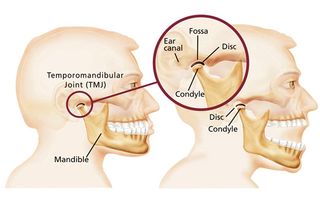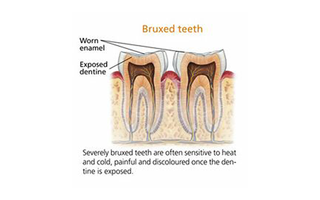TMJ Disorder
Temporomandibular joint disorder (TMD) is a common type of jaw-related pain.

TMJ is the abbreviation used for the jaw joint and is short for the temporomandibular joint.
You can feel the TMJ by placing your fingers just in front of your ears and opening and closing your mouth. A TMJ disorder may affect one or both joints, often causing pain and limited jaw function. Symptoms usually arise in early adulthood, but children and the elderly can also be affected. Most symptoms of TMJ disorders or pain are mild and do not need treatment. In these instances, a conservative and cautious approach is the best option for mild symptoms. As with pain in other joints of the body, symptoms often go away with time.

Causes of TMJ Dysfunction
- Missing teeth
- Grinding or clenching of teeth, which may as a result of stress
- Emotional or physical stress and tension in the jaw muscles
- Injuries such as TMJ fractures or dislocations
- Degenerative diseases such as osteoarthritis and rheumatoid arthritis
- Wrongly-shaped dental fillings, crowns and bridges.
Any surgical or invasive procedures (if needed) can carry certain risks. Symptoms of TMJ Dysfunction
- Limited jaw movement
- Difficulty in opening the mouth
- A stuck or locked jaw
- Clicking, grating or popping noises from the jaw joints
- Pain when chewing, yawning or widely opening the jaw
- Pain in or around the ears and cheeks
- Headaches and occasionally migraine-like headaches and nausea
- Earaches, loss of hearing or ringing in the ears (tinnitus)
- Face, neck, back and shoulder pain
- A feeling of muscle spasms
- Toothache
- Clenching and grinding of teeth
- An uncomfortable bite.

TMJ Dysfunction diagnosis
Accurate diagnosis is critical to ensure we undertake the correct treatment.
To assist with TMJ diagnosis, we may recommend:
- Making plaster models of your teeth to see if your occlusion (bite) is correctly balanced.
- Having an x-ray examination
- Completing a questionnaire and a pain diagram to assess how your symptoms affect your quality of life.
Treatment for TMJ Dysfunction can include:
- Occlusal appliance therapy (for example, a custom made splint or bite plate worn at night)
- Diet modifications (for example, only eating soft foods until symptoms resolve)
- Avoid extreme jaw movements (yawning, chewing or talking too much)
- Physiotherapy with exercises, massage, and stretching
- Heat packs for relaxation or cold packs to relieve tenderness
- Relaxation and stress management to reduce jaw tension
- Behaviour modification therapy such as counselling to identify sources of stress
- Medications such as a painkiller, anti-inflammatory, anti-anxiety, sedative or muscle relaxant to be taken only as directed
- Specialist management, if the pain is chronic, severe and other treatment has not been effective
- Surgery is very rare. We will refer to an oral and maxillofacial surgeon if needed.


